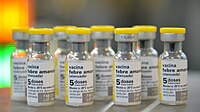
Photo from wikipedia
Introduction: Yellow fever is endemic in specific regions of sub-Saharan Africa and the Americas, with recent epidemics occurring on both continents. The yellow fever vaccine is effective, affordable and safe,… Click to show full abstract
Introduction: Yellow fever is endemic in specific regions of sub-Saharan Africa and the Americas, with recent epidemics occurring on both continents. The yellow fever vaccine is effective, affordable and safe, providing life-long immunity following a single dose vaccination. However, the vaccine production process is slow and cannot be readily scaled up during epidemics. This has led the World Health Organization (WHO) to recommend the use of fractional doses as a dose-sparing strategy during epidemics, but there are no randomized controlled trials of fractional yellow fever vaccine doses in Africa. Methods and analysis: We will recruit healthy adult volunteers, adults living with HIV, and children to a series of randomized controlled trials aiming to determine the immunogenicity and safety of fractional vaccine doses in comparison to the standard vaccine dose. The trials will be conducted across two sites; Kilifi, Kenya and Mbarara, Uganda. Recruited participants will be randomized to receive fractional or standard doses of yellow fever vaccine. Scheduled visits will include blood collection for serum and peripheral blood mononuclear cells (PBMCs) before vaccination and on various days – up to 2 years – post-vaccination. The primary outcome is the rate of seroconversion as measured by the plaque reduction neutralization test (PRNT 50) at 28 days post-vaccination. Secondary outcomes include antibody titre changes, longevity of the immune response, safety assessment using clinical data, the nature and magnitude of the cellular immune response and post-vaccination control of viremia by vaccine dose. Ethics and dissemination: The clinical trial protocols have received approval from the relevant institutional ethics and regulatory review committees in Kenya and Uganda, and the WHO Ethics Review Committee. The research findings will be disseminated through open-access publications and presented at relevant conferences and workshops. Registration: ClinicalTrials.gov NCT02991495 (registered on 13 December 2016) and NCT04059471 (registered on 15 August 2019).
Journal Title: Wellcome Open Research
Year Published: 2019
Link to full text (if available)
Share on Social Media: Sign Up to like & get
recommendations!